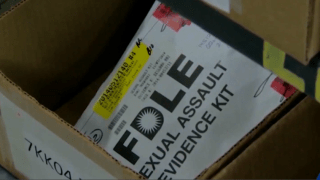
Image of a Florida Department of Law Enforcement sexual assault evidence kit
Editor’s note: This article has been updated to correct details of Mrs. Gardner’s rape and sentence of her attacker.
The best evidence to put rapists behind bars is often found in DNA samples taken from their victims.
For years in Florida, thousands of samples sat in storage unanalyzed, leaving hundreds of rapists unidentified.
That began to change after sexual assault survivors and their advocates pushed a law forcing the Florida Department of Law Enforcement to clear that backlog and take no more than four months to analyze new ones. Today, FDLE tells NBC 6, there is no backlog.
Get South Florida local news, weather forecasts and entertainment stories to your inbox. Sign up for NBC South Florida newsletters.
But there are terrifying memories left among thousands of victims waiting to see if their cases were ever resolved.
Gail Gardner was one of them.
"I was paranoid for a long time," said Gardner, 33 years after she was raped at knifepoint in her Orlando home.
Local
Despite her attacker’s DNA being collected from her body hours after the attack, he avoided capture for decades.
"I would look through the blinds all those years in the middle of the night," she recalled. "I’d get up if I heard a sound, if I heard a car I’d look."
Despite providing authorities genetic material her attacker left behind on her body, she says she didn't hear back from police on what, if anything, they had discovered.
Turned out, that was because that DNA wasn’t being examined; her so-called rape kit was ignored for decades.
"Behind each one of these kits is a survivor who’s gone through a terrible experience and had evidence collected only to have it sit on the shelf," said Ilse Knecht, director of policy and advocacy for the Joyful Heart Foundation, which advocates for sexual assault survivors.
The foundation and others pushed Florida to attack its backlog of more than 8,000 kits in 2016.
By 2019, analysis had produced 1,814 hits -- matches to DNA of rapists -- including the man who attacked Gardner more than three decades earlier.
"I had to wait a long time but I had got to the place I didn’t know what happened and I thought maybe they just caught him and didn’t tell me," she said. "I always thought that."
She said she was told the rapist was already in prison serving a life sentence and had been connected to at least 15 victims.
This year Gardner went to the legislature in Tallahassee seeking more.
"Survivors deserve to have information about their rape kits," she told a House committee. "They deserve not to spend their life as I did, not knowing and living in fear."
Shewas successful, as both houses unanimously passed a bill that would give victims access to a new, mandated state database so they can track where their rape kits are and whether any suspect has been identified.
"Survivors believe that information belongs to them and that having that information is very crucial to their healing because the sexual assault experience is one where survivors lose power and control," Knecht said.
Gardner was in Tallahassee when the bill passed the House and now, unless Gov. Ron DeSantis vetoes it, it will become law.
Officially, it will be known as Gail's Law.
"Them passing this bill is a legacy for the next generation," Gardner said.